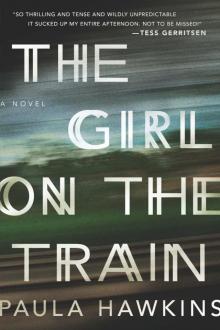- Home
- Paula Hawkins
The Girl on the Train Page 11
The Girl on the Train Read online
Page 11
I don’t know what I intended to do that day. I still don’t. At the door, I hesitate, my fingers grasped around the handle. I bite down hard on my lip. I know that if I start drinking now, I will feel better for an hour or two and worse for six or seven. I let go of the handle and walk back into the living room, and I open my laptop again. I have to apologize, I have to beg forgiveness. I log back in to my email account and see that I have one new message. It isn’t from Tom. It’s from Scott Hipwell.
Dear Rachel,
Thank you for contacting me. I don’t remember Megan mentioning you to me, but she had a lot of gallery regulars—I’m not very good with names. I would like to talk to you about what you know. Please telephone me on 07583 123657 as soon as possible.
Regards,
Scott Hipwell
For an instant, I imagine that he’s sent the email to the wrong address. This message is intended for someone else. It’s just the briefest of moments, and then I remember. I remember. Sitting on the sofa, halfway through the second bottle, I realized that I didn’t want my part to be over. I wanted to be at the heart of it.
So I wrote to him.
I scroll down from his email to mine.
Dear Scott,
Sorry for contacting you again, but I feel it’s important that we talk. I’m not sure if Megan ever mentioned me to you—I’m a friend from the gallery—I used to live in Witney. I think I have information that would interest you. Please email me back on this address.
Rachel Watson
I can feel the heat come to my face, my stomach a pit of acid. Yesterday—sensible, clearheaded, right-thinking—I decided I must accept that my part in this story was over. But my better angels lost again, defeated by drink, by the person I am when I drink. Drunk Rachel sees no consequences, she is either excessively expansive and optimistic or wrapped up in hate. She has no past, no future. She exists purely in the moment. Drunk Rachel—wanting to be part of the story, needing a way to persuade Scott to talk to her—she lied. I lied.
I want to drag knives over my skin, just so that I can feel something other than shame, but I’m not even brave enough to do that. I start writing to Tom, writing and deleting, writing and deleting, trying to find ways to ask forgiveness for the things I said last night. If I had to write down every transgression for which I should apologize to Tom, I could fill a book.
EVENING
A week ago, almost exactly a week ago, Megan Hipwell walked out of number fifteen Blenheim Road and disappeared. No one has seen her since. Neither her phone nor her bank cards have been used since Saturday, either. When I read that in a news story earlier today, I started to cry. I am ashamed now of the secret thoughts I had. Megan is not a mystery to be solved, she is not a figure who wanders into the tracking shot at the beginning of a film, beautiful, ethereal, insubstantial. She is not a cipher. She is real.
I am on the train, and I’m going to her home. I’m going to meet her husband.
I had to phone him. The damage was done. I couldn’t just ignore the email—he would tell the police. Wouldn’t he? I would, in his position, if a stranger contacted me, claiming to have information, and then disappeared. He might have called the police already; they might be waiting for me when I get there.
Sitting here, in my usual seat, though not on my usual day, I feel as though I am driving off a cliff. It felt the same this morning when I dialled his number, like falling through the dark, not knowing when you’re going to hit the ground. He spoke to me in a low voice, as though there were someone else in the room, someone he didn’t want to overhear.
“Can we talk in person?” he asked.
“I . . . no. I don’t think so . . .”
“Please?”
I hesitated just for a moment, and then I agreed.
“Could you come to the house? Not now, my . . . there are people here. This evening?” He gave me the address, which I pretended to note down.
“Thank you for contacting me,” he said, and he hung up.
I knew as I was agreeing that it wasn’t a good idea. What I know about Scott, from the papers, is almost nothing. What I know from my own observations, I don’t really know. I don’t know anything about Scott. I know things about Jason—who, I have to keep reminding myself, doesn’t exist. All I know for sure—for absolutely certain—is that Scott’s wife has been missing for a week. I know that he is probably a suspect. And I know, because I saw that kiss, that he has a motive to kill her. Of course, he might not know that he has a motive, but . . . Oh, I’ve tied myself up in knots thinking about it, but how could I pass up the opportunity to approach that house, the one I’ve observed a hundred times from the trackside, from the street? To walk up to his front door, to go inside, to sit in his kitchen, on his terrace, where they sat, where I watched them?
It was too tempting. Now I sit on the train, my arms wrapped around myself, hands jammed against my sides to stop them from trembling, like an excited child caught up in an adventure. I was so glad to have a purpose that I stopped thinking about the reality. I stopped thinking about Megan.
I’m thinking about her now. I have to convince Scott that I knew her—a little, not a lot. That way, he’ll believe me when I tell him that I saw her with another man. If I admit to lying right away, he’ll never trust me. So I try to imagine what it would have been like to drop by the gallery, chat with her over a coffee. Does she drink coffee? We would talk about art, perhaps, or yoga, or our husbands. I don’t know anything about art, I’ve never done yoga. I don’t have a husband. And she betrayed hers.
I think of the things her real friends said about her: wonderful, funny, beautiful, warmhearted. Loved. She made a mistake. It happens. We are none of us perfect.
ANNA
• • •
SATURDAY, JULY 20, 2013
MORNING
Evie wakes just before six. I get out of bed, slip into the nursery and pick her up. I feed her and take her back to bed with me.
When I wake again, Tom’s not at my side, but I can hear his footfalls on the stairs. He’s singing, low and tuneless, “Happy birthday to you, happy birthday to you . . .” I hadn’t even thought about it earlier, I’d completely forgotten; I didn’t think of anything but fetching my little girl and getting back to bed. Now I’m giggling before I’m even properly awake. I open my eyes and Evie’s smiling, too, and when I look up, Tom’s standing at the foot of the bed, holding a tray. He’s wearing my Orla Kiely apron and nothing else.
“Breakfast in bed, birthday girl,” he says. He places the tray at the end of the bed and scoots round to kiss me.
I open my presents. I have a pretty silver bracelet with onyx inlay from Evie, and a black silk teddy and matching knickers from Tom, and I can’t stop smiling. He climbs back into bed and we lie with Evie between us. She has her fingers curled tightly around his forefinger and I have hold of her perfect pink foot, and I feel as though fireworks are going off in my chest. It’s impossible, this much love.
A while later, when Evie gets bored of lying there, I get her up and we go downstairs and leave Tom to snooze. He deserves it. I potter round, tidying up a bit. I drink my coffee outside on the patio, watching the half-empty trains rattle past, and think about lunch. It’s hot—too hot for a roast, but I’ll do one anyway, because Tom loves roast beef, and we can have ice cream afterwards to cool us down. I just need to pop out to get that Merlot he likes, so I get Evie ready, strap her in the buggy and we stroll down to the shops.
Everyone told me I was insane to agree to move in to Tom’s house. But then everyone thought I was insane to get involved with a married man, let alone a married man whose wife was highly unstable, and I’ve proved them wrong on that one. No matter how much trouble she causes, Tom and Evie are worth it. But they were right about the house. On days like today, with the sun shining, when you walk down our little street—tree-lined and tidy, not quite a cul-de-sac, but with the same sense
of community—it could be perfect. Its pavements are busy with mothers just like me, with dogs on leads and toddlers on scooters. It could be ideal. It could be, if you weren’t able to hear the screeching brakes of the trains. It could be, so long as you didn’t turn around and look back down towards number fifteen.
When I get back, Tom is sitting at the dining room table looking at something on the computer. He’s wearing shorts but no shirt; I can see the muscles moving under his skin when he moves. It still gives me butterflies to look at him. I say hello, but he’s in a world of his own, and when I run my fingertips over his shoulder he jumps. The laptop snaps shut.
“Hey,” he says, getting to his feet. He’s smiling but he looks tired, worried. He takes Evie from me without looking me in the eye.
“What?” I ask. “What is it?”
“Nothing,” he says, and he turns away towards the window, bouncing Evie on his hip.
“Tom, what?”
“It’s nothing.” He turns back and gives me a look, and I know what he’s going to say before he says it. “Rachel. Another email.” He shakes his head and he looks so wounded, so upset, and I hate it, I can’t bear it. Sometimes I want to kill that woman.
“What’s she said?”
He just shakes his head again. “It doesn’t matter. It’s just . . . the usual. Bullshit.”
“I’m sorry,” I say, and I don’t ask what bullshit exactly, because I know he won’t want to tell me. He hates upsetting me with this stuff.
“It’s OK. It’s nothing. Just the usual pissed nonsense.”
“God, is she ever going to go away? Is she ever going to just let us be happy?”
He comes over to me and, with our daughter between us, kisses me. “We are happy,” he says. “We are.”
EVENING
We are happy. We had lunch and lay out on the lawn, and then when it got too hot we came inside and ate ice cream while Tom watched the Grand Prix. Evie and I made play dough, and she ate quite a bit of that, too. I think about what’s going on down the road and I think about how lucky I am, how I got everything that I wanted. When I look at Tom, I thank God that he found me, too, that I was there to rescue him from that woman. She’d have driven him mad in the end, I really think that—she’d have ground him down, she’d have made him into something he’s not.
Tom’s taken Evie upstairs to give her a bath. I can hear her squealing with delight from here and I’m smiling again—the smile has barely fallen from my lips all day. I do the washing up, tidy up the living room, think about dinner. Something light. It’s funny, because a few years ago I would have hated the idea of staying in and cooking on my birthday, but now it’s perfect, it’s the way it should be. Just the three of us.
I pick up Evie’s toys, scattered around the living room floor, and return them to their trunk. I’m looking forward to putting her down early tonight, to slipping into that teddy Tom bought me. It won’t be dark for hours yet, but I light the candles on the mantelpiece and open the second bottle of Merlot to let it breathe. I’m just leaning over the sofa to pull the curtains shut when I see a woman, her head bent to her chest, scuttling along the pavement on the opposite side of the street. She doesn’t look up, but it’s her, I’m sure of it. I lean farther forward, my heart hammering in my chest, trying to get a better look, but the angle’s wrong and I can’t see her now.
I turn, ready to bolt out of the front door to chase her down the street, but Tom’s standing there in the doorway, Evie wrapped in a towel in his arms.
“Are you OK?” he asks. “What’s wrong?”
“Nothing,” I say, stuffing my hands into my pockets so that he can’t see them shaking. “Nothing’s wrong. Nothing at all.”
RACHEL
• • •
SUNDAY, JULY 21, 2013
MORNING
I wake with my head full of him. It doesn’t seem real, none of it does. My skin prickles. I would dearly love to have a drink, but I can’t. I need to keep a clear head. For Megan. For Scott.
I made an effort yesterday. I washed my hair and put some makeup on. I wore the only jeans I still fit into, with a cotton print blouse and sandals with a low heel. I looked OK. I kept telling myself that it was ridiculous to care about my appearance, because the last thing Scott was going to be thinking about was what I looked like, but I couldn’t help myself. It was the first time I was ever going to be around him, it mattered to me. Much more than it should.
I took the train, leaving Ashbury around six thirty, and I was in Witney just after seven. I took that walk along Roseberry Avenue, past the underpass. I didn’t look this time, couldn’t bear to. I hurried past number twenty-three, Tom and Anna’s place, chin to chest and sunglasses on, praying they wouldn’t see me. It was quiet, no one around, a couple of cars driving carefully down the centre of the road between ranks of parked vehicles. It’s a sleepy little street, tidy and affluent, with lots of young families; they’re all having their dinner around seven o’clock, or sitting on the sofa, mum and dad with the little ones squeezed between them, watching The X Factor.
From number twenty-three to number fifteen can’t be more than fifty or sixty paces, but that journey stretched out, it seemed to take an age; my legs were leaden, my footing unsteady, as though I were drunk, as though I might just slip off the pavement.
Scott opened the door almost before I’d finished knocking, my trembling hand still raised as he appeared in the doorway, looming ahead of me, filling the space.
“Rachel?” he asked, looking down at me, unsmiling. I nodded. He offered his hand and I took it. He gestured for me to enter the house, but for a moment I didn’t move. I was afraid of him. Up close he is physically intimidating, tall and broad-shouldered, his arms and chest well defined. His hands are huge. It crossed my mind that he could crush me—my neck, my rib cage—without much effort.
I moved past him into the hallway, my arm brushing against his as I did, and felt a flush rising to my face. He smelled of old sweat, and his dark hair was matted against his head as though he hadn’t showered in a while.
It was in the living room that the déjà vu hit me, so strong it was almost frightening. I recognized the fireplace flanked by alcoves on the far wall, the way the light streamed in from the street through slanted blinds; I knew that when I turned to my left there would be glass and green and beyond that the railway line. I turned and there was the kitchen table, the French doors behind it and the lush patch of lawn. I knew this house. I felt dizzy, I wanted to sit down; I thought about that black hole last Saturday night, all those lost hours.
It didn’t mean anything, of course. I know that house, but not because I’ve been there. I know it because it’s exactly the same as number twenty-three: a hallway leads to the stairs, and on the right-hand side is the living room, knocked through into the kitchen. The patio and the garden are familiar to me because I’ve seen them from the train. I didn’t go upstairs, but I know that if I had, there would have been a landing with a large sash window on it, and that if you climbed through that window you would find yourself on the makeshift roof terrace. I know that there will be two bedrooms, the master with two large windows looking out onto the street and a smaller room at the back, overlooking the garden. Just because I know that house inside and out does not mean that I’ve been there before.
Still, I was trembling when Scott showed me into the kitchen. He offered me a cup of tea. I sat down at the kitchen table while he boiled the kettle, dropped a tea bag into a mug and slopped boiling water over the counter, muttering to himself under his breath. There was a sharp smell of antiseptic in the room, but Scott himself was a mess, a sweat patch on the back of his T-shirt, his jeans hanging loose on his hips as though they were too big for him. I wondered when was the last time he had eaten.
He placed the mug of tea in front of me and sat on the opposite side of the kitchen table, his hands folded in front of him. The s
ilence stretched out, filling the space between us, the whole room; it rang in my ears, and I felt hot and uncomfortable, my mind suddenly blank. I didn’t know what I was doing there. Why on earth had I come? In the distance, I heard a low rumbling—the train was coming. It felt comforting, that old sound.
“You’re a friend of Megan’s?” he said at last.
Hearing her name from his lips brought a lump to my throat. I stared down at the table, my hands wrapped tightly around the mug.
“Yes,” I said. “I know her . . . a little. From the gallery.”
He looked at me, waiting, expectant. I could see the muscle flex in his jaw as he clenched his teeth. I searched for words that wouldn’t come. I should have prepared better.
“Have you had any news?” I asked. His gaze held mine, and for a second I felt afraid. I’d said the wrong thing; it was none of my business whether there was any news. He would be angry, he’d ask me to leave.
“No,” he said. “What was it that you wanted to tell me?”
The train rolled slowly past and I looked out towards the tracks. I felt dizzy, as though I were having an out-of-body experience, as though I were looking out at myself.
“You said in your email that you wanted to tell me something about Megan.” The pitch of his voice raised a little.
I took a deep breath. I felt awful. I was acutely aware that what I was about to say was going to make everything worse, was going to hurt him.

 Girl on the Train
Girl on the Train The Girl on the Train
The Girl on the Train Into the Water
Into the Water A Slow Fire Burning
A Slow Fire Burning